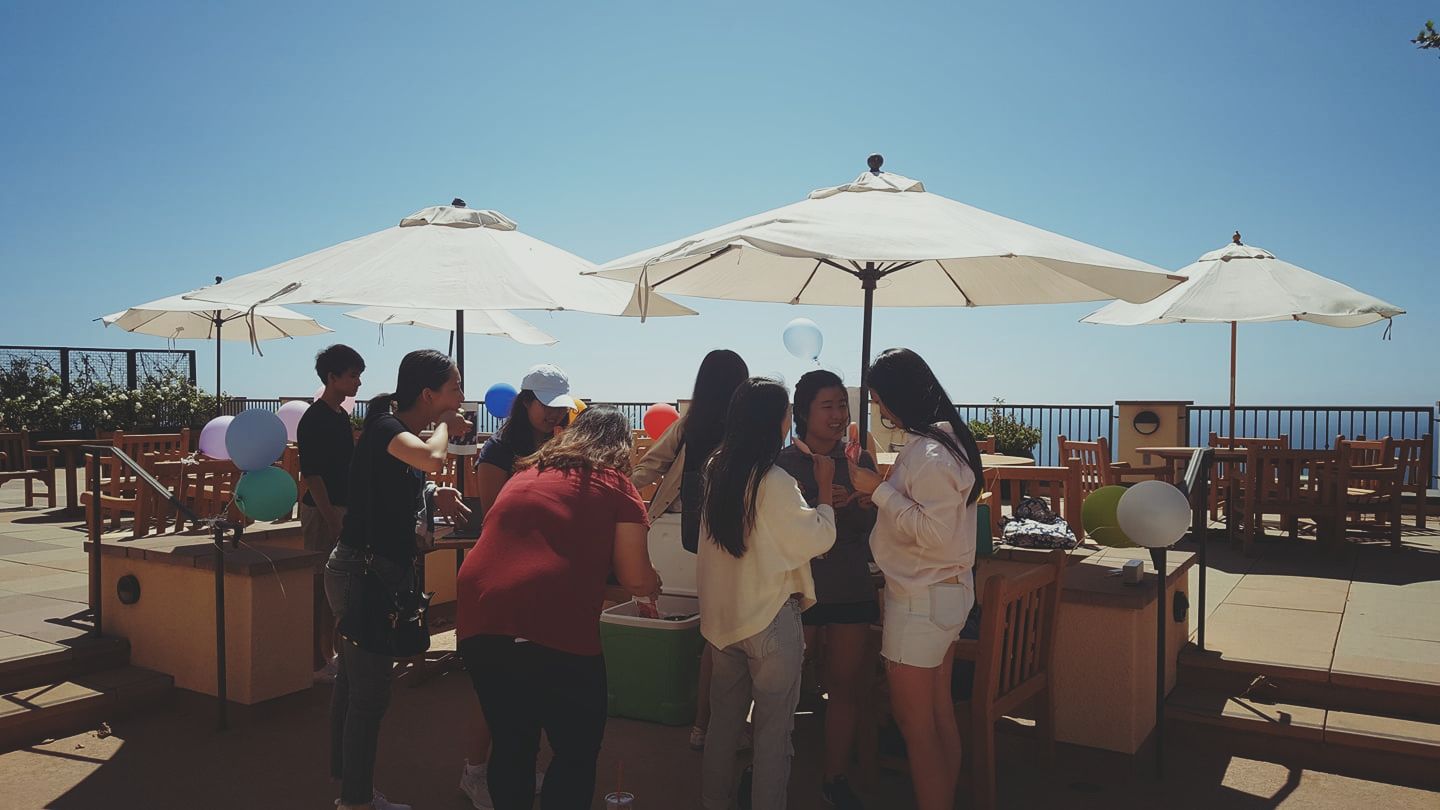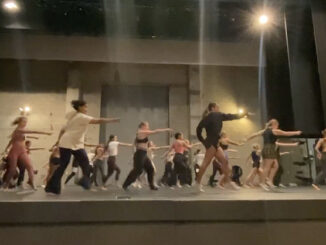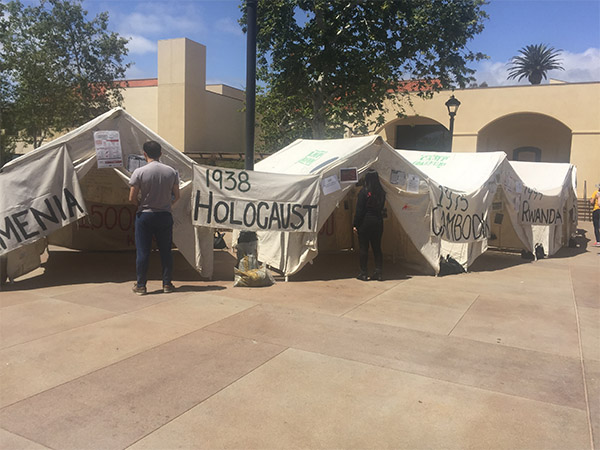
Pepperdine administrators encourage free speech on campus, but student leaders give the campus mixed evaluations when it comes to the ability to speak freely.
Pepperdine’s Seaver College offers over 90 clubs and organizations for the student body to get involved in. These clubs work actively on campus to advocate for their respective missions and to engage the student body according to their organization’s goals. Whereas many club leaders said they receive support from administrators, faculty and students, a minority said their voices feel unwelcome.
“I definitely feel like there is a free voice on campus, especially with the Armenian Student Association,” said Genevieve Gourdikian, a junior integrated marketing communication major. “I know that our club does a lot to raise awareness of the Armenian genocide that happened in 1924, and I would say that it’s gone over well.”
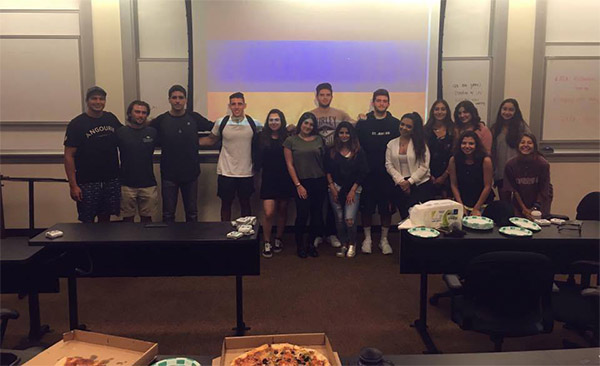
Gourdikian said she thinks the campus atmosphere allows her to speak freely even though the Armenian Student Association deals with a politically charged issue.
“Talking about the Armenian Genocide is a big political statement because Turkish people don’t agree that it actually happened,” Gourdikian said. “Having the voice to speak out, raise awareness, and have events about it, I feel like that’s the administration helping students who firmly believe that it’s an important issue.”
Austin Welch, Pepperdine College Republicans chairman and Student Government Association vice president, agreed with Gourdikian that it is important to have events and raise awareness of both national and campus issues.
“In regard to Pepperdine College Republicans, I don’t think that there is any hiding or any censorship of dialogue,” said Welch, a sophomore political science and business administration double major. “I feel like anyone on campus can say what they feel and that the freedom wall by the Caf is a great illustration of that. It creates healthy dialogue and I think promoting more events and having more ways for people to talk, and maybe disagree, and have thoughtful conversation is something very worthwhile.”
No Lost Generation, another campus club, works to spread awareness about the global refugee crisis and raise money for the education of refugee children. Molly Pasquarella, a junior political science major and active No Lost Generation member, said she believes that despite the political messages No Lost Generation speaks out about, they are still able to speak freely.
“We arranged a protest right after the immigration refugee ban,” Pasquarella said. “It got approved right away and we did it the next day — there were about 75 people there. The administration was very supportive and there was a dean that came, professors came, and it was great to see that adults in our community were supporting our message.”
Pasquarella said the campus atmosphere does not impact her organization’s ability to voice its message.
“I think a lot of what we’re standing for is politically charged,” Pasquarella said. “There are definitely people on campus who don’t support what we’re doing, but I don’t think it’s an obnoxious presence and it’s not one that has stopped us from doing what we would like to do as of yet.”
Minoritized voices
While some student club members said they get strong support from the Pepperdine community to speak freely, others believe their voices are sometimes hindered.
“Just getting people to listen to what the Latino Student Association has to say is probably the hardest thing,” said Alex Figueroa, a junior international business major and member of the Latino Student Association.
Figueroa has personally experienced lack of acceptance from the student body.
“We’ve had students come up to us and tell us that we shouldn’t be allowed to have the Latino Student Association on campus,” Figueroa said. “They’ve said that LSA is prejudiced and that we don’t let white people in, which is not true. We love to have a space where everyone can come together and talk about campus issues.”
This lack of support from the student body has impacted Figueroa’s experience with campus dialogue and her ability to speak freely.
“Socially, I feel a lot of pressure to censor myself, especially at a place like Pepperdine where we are a minority,” Figueroa said. “I’ve never felt as though I was going to be chastised by the faculty, but definitely by other students. I would say we don’t feel really comfortable.”
The administration directly censored Dance In Flight, Pepperdine University’s student-led dance company.
“When I was choreographing for our 2017 show, it was made clear to me that two individuals of the same sex would not be allowed to engage in a romantic dance on Smother’s stage since DIF is a Student Activities-sponsored event,” said David Limon, Dance In Flight choreographer and senior psychology major. “It affected my dancers and other LGBTQ+ groups on campus. Many people wanted some form of justice, but no one knew what it would look like.”
Limon said he understood the reason for censorship.
“Pepperdine functions based mostly on donors, so regardless of what the students want, the donors have to be constantly considered or there would be no Pepperdine to change,” Limon said.
Bria Dunlap, junior public relations major and member of the Black Student Association, has also heard about issues with censorship on campus.
Students demonstrated in the Caf in November 2015 sporting Waves Against Ignorance signs. The peaceful sit-in was in solidarity with University of Missouri students and in response to racist posts on the social media app Yik Yak.
“I work in the Admissions Office and I remember someone telling me that they had purposefully redirected a campus tour during that demonstration in the Caf last year to make it seem as though Pepperdine does not have issues with trying to censor its students,” Dunlap said. “If people’s voices are not being heard and people have to go to the lengths of a demonstration in order for that to happen and you shield prospective students from that, I’m kind of disgusted. I fully understand it, I’m a public relations major, so I understand optics and angles and looking good, but that did not sit well with me.”
The Black Student Association has had ongoing discussions with the Pepperdine administration about various offensive issues on campus.
“A lot of BSA’s battle last year with administration was trying to get them to understand that some of the practices that they have here do not fully support the students that go here,” Dunlap said.
Several changes have been implemented, but students said more work needs to be done. The administration moved the Christopher Columbus statue to Florence, Italy in February. The administration removed the wooden mural that students deemed offensive in late July. Pepperdine hosted The Summit on Diversity and Inclusion in Elkins Auditorium with Vanguard, Biola and Westmont universities in November. The first cohort of faculty and student support staff went through diversity training over the last year and the administration is working to incorporate more diversity into the curriculum.
“When we’re complaining about the Columbus statue or the mural in the Caf, I think the automatic assumption is, ‘You’re Millennials, you’re being overly sensitive to things that have been here for however long,’” Dunlap said. “I think that’s what they initially did with BSA is just wrote off our complaints, but I think they’re starting to understand that you can’t ignore the people that you’re supposed to be here for.”
The Black Student Association continues to contribute to campus dialogue through writing a monthly column in The Graphic.
This is BSA’s 1st article in the Graphic that was published online a few days ago. The column will be monthly,… https://t.co/1JZgAlOvZ8
— Pepperdine BSA (@PepperdineBSA) August 29, 2016
The Freedom Wall
The Freedom Wall functions as an anonymous, uncensored way for students to express their opinions, but Dunlap does not believe that it is an edifying platform of communication for the Pepperdine community.
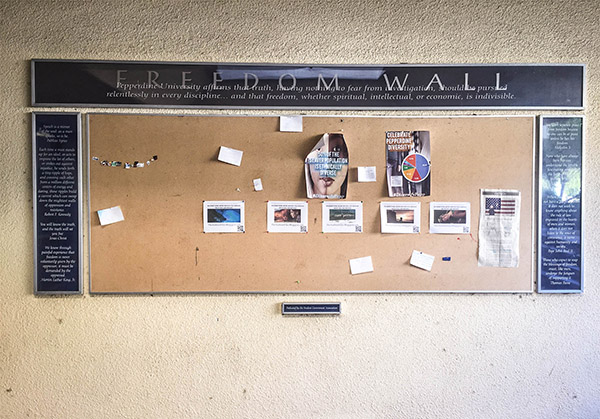
“The only time I hear stuff about the Freedom Wall is when it’s very controversial and going against the progressive atmosphere that we’re trying to have here,” Dunlap said. “If the only time people are really talking about the wall is when someone posts something that is ugly and offensive, then maybe it should come down.”
Pepperdine University Chaplain Sara Barton agreed with Dunlap that the Freedom Wall is often offensive. She believes that the anonymity of the wall can lead some to post hateful speech.
Barton wrote a poem Jan. 23 to respond to several negative messages posted on the Freedom Wall after the election. “A Poem For the Freedom Wall” remains there currently.
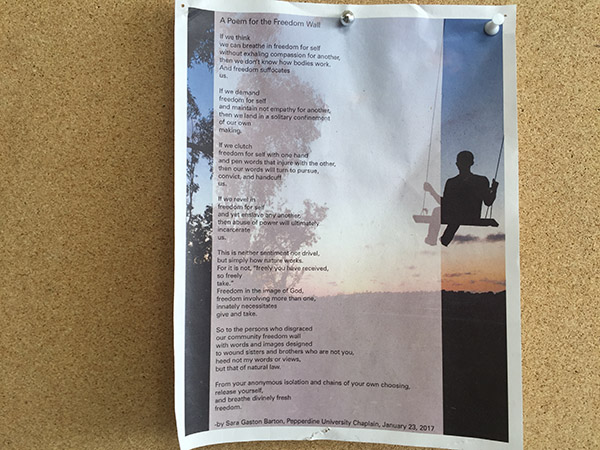
The poem directly addresses whoever posted the hateful message, saying in the concluding stanza:
“From your anonymous isolation and chains of your own choosing,
release yourself,
and breathe divinely fresh
freedom.”
“Anonymity can imprison us even as we think it’s setting us free,” Barton said. “I tried to make something beautiful, to try to undermine the negativity taking place.”
Christina Zimmerman completed this story under the supervision of Dr. Christina Littlefield in Jour 241 in spring 2017.

